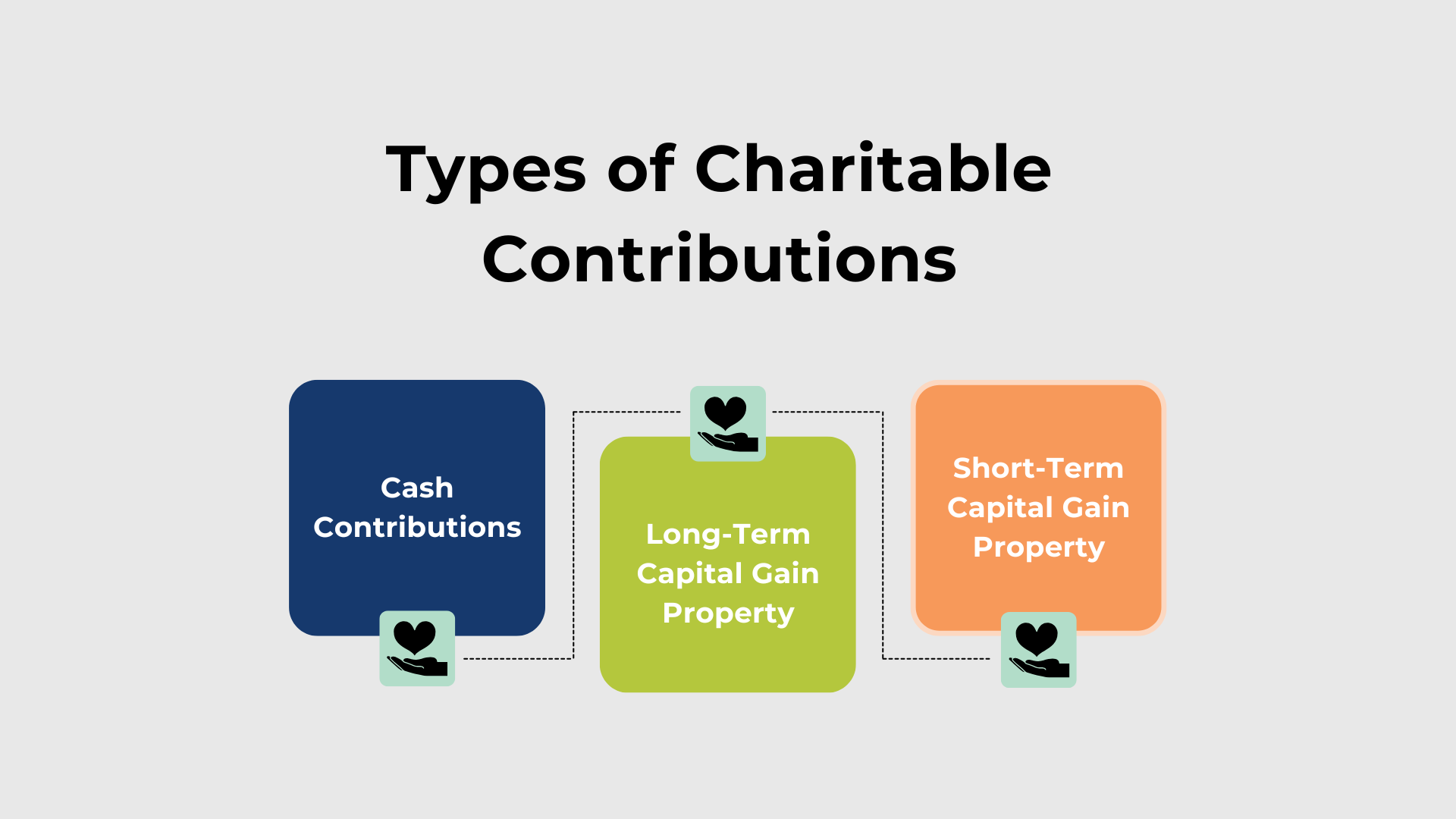Imagine enjoying your ideal retirement, knowing you’re making a difference and keeping more of your hard-earned money. By claiming a charity donation tax deduction, you can support the causes you care about and potentially reduce your taxes!
This guide explores how to make tax-deductible charitable donations for 2025, with your retirement goals in mind. You’ll learn how to maximize your impact and make your retirement even more satisfying.
Key Takeaways
- Reduce your tax bill: Charitable giving can potentially lower your taxable income if you itemize your deductions and follow the rules.
- Unlock additional tax advantages: Explore using strategies like Qualified Charitable Distributions (QCDs) and Donor-Advised Funds (DAFs) to optimize your tax benefits.
- Stay informed: Keep up-to-date on the latest laws and regulations for tax-deductible charitable donations to avoid expensive mistakes.
What Are Tax-Deductible Charitable Donations?
Tax-deductible charitable donations are a win-win: you give to your favorite charities and potentially reduce your taxable income. This works by itemizing your deductions instead of claiming the standard deduction.
For a donation to be tax deductible, you need to give to a qualified organization. Typically the organization has to be non-profit with a 501(c)(3) status.
Why Charitable Donations Are Tax-Deductible
The government encourages charitable giving by offering tax deductions as a behavioral incentive. Essentially, the government wants to encourage giving to charities by offering you a tax discount. Here are some other examples of tax deductions as government behavioral incentives:
- Mortgage Interest Deduction: Incentivizes purchasing a home
- Married Filing Joint Tax Filing Status: Incentivizes marriage
- Student Loan Interest Deduction: Incentivizes college attendance
Types of Charitable Contributions That Qualify

You can make tax-deductible charitable contributions in a few different ways:
- Cash Contributions: The most common and straightforward type of donation you can make. Cash donations include payments made via physical cash, check, or electronic transfer.
- Long-Term Capital Gain Property: Donations of items held for over one year, such as furniture, vehicles, jewelry, real estate, or securities (stocks and bonds).
- Ordinary Income or Short-Term Capital Gain Property: This includes donating securities (stocks and bonds) held for less than a year. Other examples include artwork you created or your business inventory.
Types of Charitable Contributions That Don’t Qualify
Your charitable donations won’t always qualify for a tax deduction. Some common examples include:
- Gifts to individuals (family, friends, etc)
- Donations to many foreign organizations
- Political donations to groups or candidates
- Trying to deduct the value of your time when volunteering
Eligibility Requirements for Charitable Donation Deductions
To claim tax-deductible donations on your tax return, you need to satisfy the following requirements:
- Itemize your deductions: You’ll need to choose to itemize instead of taking the standard deduction. The 2017 Tax Cuts and Jobs Act significantly increased the standard deduction, making itemizing less attractive.
- Donate to a qualified charitable organization: The organization must be a registered 501(c)(3) non-profit.
- Keep records and documentation: Maintain receipts and documentation for all of your donations. You’ll need these if the IRS ever audits you.
Qualified Organizations
While many charities, churches, and educational institutions qualify for tax deductible donations, it’s important to check that your preferred charity is a 501(c)(3) non-profit. You can verify an organization’s status using the IRS Tax Exempt Organization Search Tool.
Documentation Requirements
When you make a donation, keep records like bank or credit card statements, or receipts of your gift. They need to show the donation amount, the organization’s name, the date, and a description of what you donated.
For non-cash donations exceeding $5,000 in value, an appraisal may be required. The appraisal cost is not deductible.
Itemizing Deductions vs. Standard Deduction
For your charitable contributions to be deductible, you need to itemize deductions on your tax return. The decision to itemize your deductions vs. taking the standard deduction comes down to picking the option that will reduce your taxes the most.
In 2025, the standard deduction amounts are:
| Filing Status | Deduction | Additional Amount for Age 65+ or Blindness |
| Married Filing Jointly (MFJ) | $30,000 | $1,600 |
| Single | $15,000 | $2,000 |
Itemizing your deductions might be beneficial if you are making large charitable donations, and also have:
- Mortgage interest
- Student loan interest
- High state and local taxes including property taxes
- A lot of out-of-pocket medical expenses
Alternatively, if you make a small charitable donation and don’t have much else to deduct, you might pay less in taxes by taking the standard deduction.
Consider consulting a tax professional to determine your best approach.
Limits on Charitable Contribution Deductions
When you make a donation, you can only deduct a certain amount of your Adjusted Gross Income (AGI). The limits vary depending on the type of your donation and the organization.
You can generally deduct cash contributions to public charities up to 60% of your Adjusted Gross Income (AGI) in that year. However, the rules are different when you donate long-term or short-term capital gain property.
You may be able to deduct up to 60%, 50%, 30%, or 20% of your AGI for long-term or short-term gain property, depending on:
- The type of charitable organization
- Whether you deduct the fair market value (FMV) or your cost basis
- How the charity will use the donated item
Carryover Rules for Excess Donations
If your donations exceed the deductible limits in a given year, you can carry over the excess and deduct donations for up to 5 years following the gift.
For example, if you donate $80,000 in cash to an eligible charity and your AGI is $100,000, you can likely deduct $60,000 in the year of the gift (60% of your AGI). You could carry forward the remaining $20,000 and deduct it for up to 5 years.
Strategies for Maximizing Charitable Contribution Deductions
To optimize your charitable tax deductions, consider exploring these strategies with the help of your tax professional:
- Bundle Your Donations: Consider making larger charitable donations every few years instead of smaller annual donations to exceed the standard deduction threshold.
- Donate Highly Appreciated Assets: Instead of making cash contributions, you can potentially avoid capital gains taxes by donating assets like stocks with large gains even if you don’t itemize.
- Take Advantage of Qualified Charitable Distributions (QCDs): At some point, you’ll reach the age when you need to take Required Minimum Distributions (RMDs) from your IRAs and 401(k)s. You can avoid paying taxes on them by making direct donations from those accounts to an eligible charity. This also doesn’t require itemizing on your return.
- Utilize Donor-Advised Funds (DAFs): These vehicles allow you to make a lump-sum charitable contribution and receive an immediate tax deduction. Then, you can distribute the funds to your favorite charities over time.
Special Rules for the 2025 Tax Year
For 2025, the standard deduction amounts have increased slightly from the 2024 tax year. This makes the standard deduction even more attractive compared to itemizing.
To stay up-to-date on IRS rule changes for charitable contributions, check IRS Publication 526.
Common Mistakes to Avoid when Claiming Charitable Deductions
Tax mistakes can be costly and stressful. Here are some common pitfalls to avoid:
- Deducting contributions made to non-qualified organizations: Always verify the organization’s 501(c)(3) status.
- Failing to keep proper receipts and records: Maintain detailed receipts for all charitable contributions in case of an IRS audit.
- Overvaluing non-cash charitable contributions: Understand the rules around deducting your cost basis versus the asset’s fair market value. Deduct the asset’s accurate fair market value and obtain appraisals when needed.
- Not working with a professional: Be sure to consult with your tax professional and attorney for personalized tax and legal advice.
Discover How Stage Ready Financial Planning Can Help You Reduce Your Taxes
Planning your tax-deductible charitable donations and optimizing your finances can feel overwhelming. Offering comprehensive financial planning to retirement savers like you, Stage Ready Financial Planning can help you achieve your ideal retirement while potentially reducing taxes and supporting causes you care about.
Contact us today to schedule your complimentary intro call and learn how we can help you reduce your tax bill in retirement!
FAQs
How much of my charitable donation is tax-deductible?
The amount you can deduct depends on factors like the type of asset you donate, the organization, and your Adjusted Gross Income. You can usually deduct up to 60% of your Adjusted Gross Income for cash contributions to public charities. Limits may be lower for other types of property donations.
Is it worth claiming charitable donations?
Claiming charitable donations can be beneficial if you itemize deductions and have many other deductions. Even if you’ve made charitable gifts, the standard deduction might save you more in taxes unless you also have:
- Significant mortgage interest
- Student loan interest
- State and local tax payments including property taxes
- Out-of-pocket medical expenses
Consult your tax professional to determine your best option.
Can I deduct charitable contributions if I take the standard deduction?
No. You can only deduct charitable contributions if you itemize deductions. In 2020 and 2021, the IRS permitted a small charitable deduction even if you took the standard deduction. This expired after 2021 and has not been reinstated. You can however donate appreciated stock and avoid capital gains tax even when
About the Author

Joseph A. Eck, CFP®, is a financial planner passionate about helping retirement savers achieve their financial goals and make a positive impact on the world. With years of experience in estate planning, retirement planning, and charitable giving strategies, Joseph provides personalized guidance and support to clients in Dayton and Southwest Ohio. He believes that everyone deserves to feel confident living their ideal retirement and leaving a lasting legacy. Click here to learn more about Joseph.
Article References
- Internal Revenue Service. (n.d.). Search for Tax Exempt Organizations. Retrieved from https://www.irs.gov/charities-non-profits/search-for-tax-exempt-organizations
- Internal Revenue Service. (n.d.). IRS Releases Tax Inflation Adjustments for Tax Year 2025. https://www.irs.gov/newsroom/irs-releases-tax-inflation-adjustments-for-tax-year-2025#:~:text=For%20single%20taxpayers%20and%20married,%24800%20from%20tax%20year%202024.
- Internal Revenue Service. (n.d.). About Publication 526. https://www.irs.gov/forms-pubs/about-publication-526
- Internal Revenue Service. (n.d.). Expanded Tax Benefits Help Individuals and Businesses Give to Charity During 2021; Deductions up to $600 Available for Cash Donations by Non-Itemizers.https://www.irs.gov/newsroom/expanded-tax-benefits-help-individuals-and-businesses-give-to-charity-during-2021-deductions-up-to-600-available-for-cash-donations-by-non-itemizers
This communication is for informational purposes only and is not intended as investment, tax, accounting, or legal advice, as an offer or solicitation of an offer to buy or sell, or as an endorsement of any company, security, fund, or other securities or non-securities offering. This communication should not be relied upon as the sole factor in an investment making decision. Past performance is no indication of future results.
